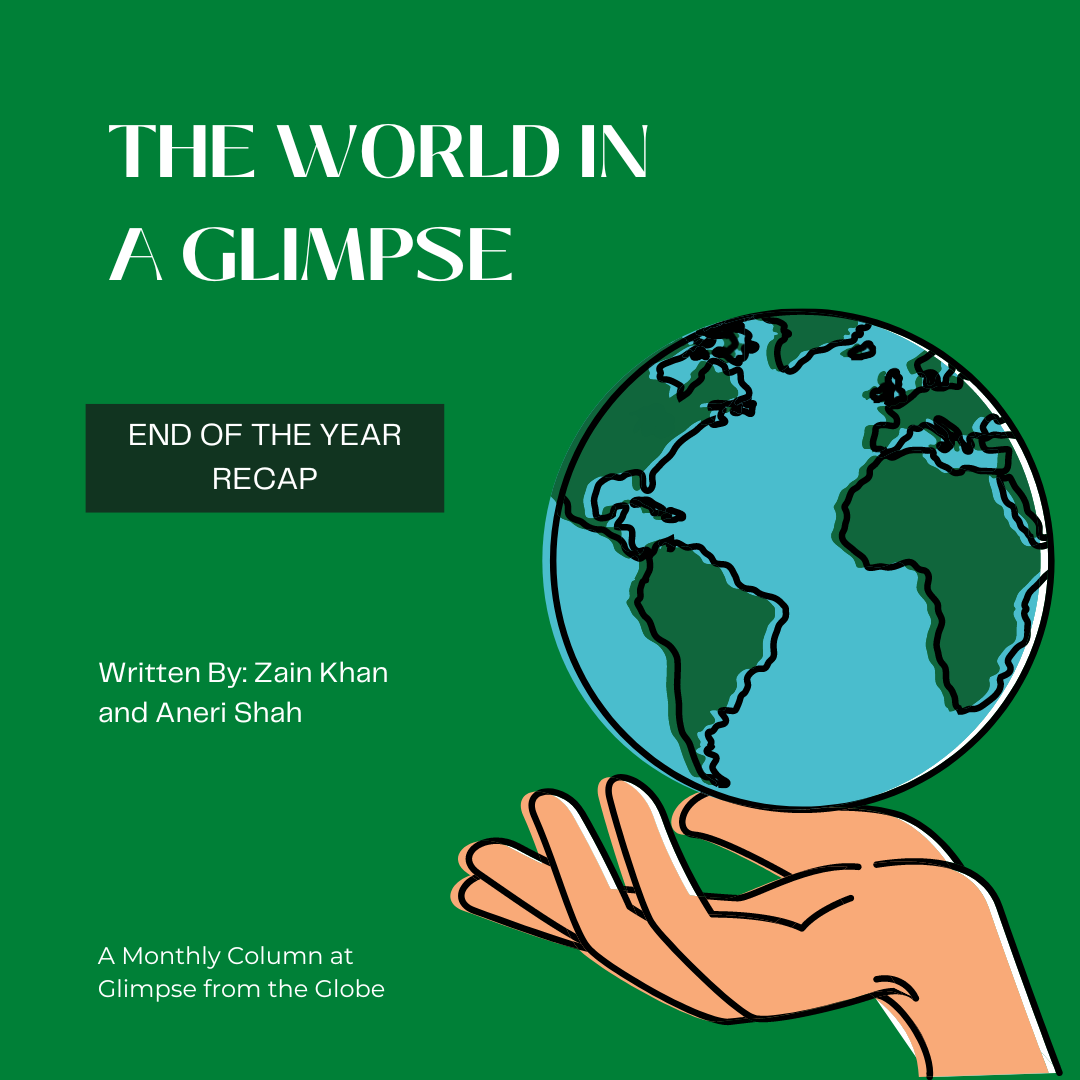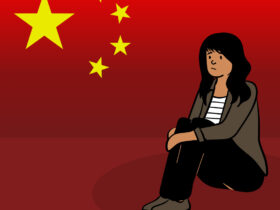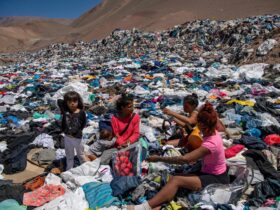By: Aneri Shah and Zain Khan
NORTH AMERICA & SOUTH AMERICA
Peru
Political Protests Seize Peru After Removing Former President From Office
Peru’s democracy is young and fragile, often experiencing rapid turnovers in the presidency due to political scandals and corruption. Peru’s former President, Pedro Castillo, continues along this course. After surviving two impeachments, the Peruvian Congress held a third vote of impeachment this month. Castillo, calling the vote a ‘coup’ attempt, tried to dissolve Congress. Even many of his closest supporters found this move grossly unconstitutional, and this act was followed by a slew of resignations and a removal of Castillo from power. He is now under arrest.
In his place, Congress appointed its first female president, Dina Boluarte, who had been serving as his vice president. However, Boluarte is struggling with quelling the protests, which have turned violent and lethal. The death toll of these protests is currently in the mid-20s, most of them being teenagers. In response, Boluarte has called in the military and imposed curfews, a move that has been criticized by many, including human rights groups.
The protests in Peru have no leader, so it is challenging to give them a spot at the table when deciding how to move the country forward. However, protestors seem unified when calling for Ms. Boluarte to step down in favor of a new general election and even a new constitution. Some even want Mr. Castillo to be reinstated.
As Peru looks forward, it must struggle to find a satisfactory solution in a tenuous system.
Chile
Chile to Open Embassy in Occupied Palestinian Territories
The Andrean Country of Chile further legitimizes the statehood of occupied Palestine following the president’s statements on Dec. 22. President Gabriel Boric made the remarks on Monday that the country plans to open a fully functioning embassy in the West Bank during a private ceremony in Santiago hosted by the city’s important Palestinian diaspora.
“I am taking a risk (saying) this… we are going to raise our official representation in Palestine from having a charge d’affaires; now we are going to open an embassy,” Boric said.
This would make Chile among a handful of countries to have an embassy-level office in Palestinian territories which are contested with Israel. Chile and Palestine share similarities in terms of their struggle with neoliberal violence. Both indigenous populations–the Mapuche of Chile, and Palestinians–face the horrors of Israeli military weapons and surveillance technology.
United States
Ukrainian President Zelenskyy makes historic visit to the United States following Russian aggression
In his first diplomatic trip overseas after the invasion of Ukraine in February, Volodymyr Zelenskyy on Dec. 21. Zelenskyy addressed Congress and thanked them for the aid calling it an “investment” towards democracy.
“I hope my words of respect and gratitude resonate in each American heart,” Zelensky said during the joint meeting of Congress, later adding, “Against all odds, and doom and gloom scenarios, Ukraine didn’t fall. Ukraine is alive and kicking.”
Ukrainian-American relations have strengthened ever since the invasion with the United States being one the highest supporters of Ukraine by providing the most military assistance, more than every other country combined.
On the other hand, the relationship between Russia and the United States has significantly declined with travel being banned to Russia and both countries expelling respective ambassadors.
SCOTUS Votes for Pandemic Era Migrant Policy Continue
This month, the Supreme Court said that the migration policy made in March 2020 should stay in place until February, when it will hear the arguments of the case. The migration policy, known as Title 42, was made as a public health order during the pandemic; it allows migrants to be expelled from the border and block their access to asylum.
The Biden administration has called for an end to the rule, but may need the extra time granted by the Supreme Court to plan how to deal with the influx of migrants expected to happen as soon as the policy is restricted.
Some on the Supreme Court, such as Chief Justice Neil Gorsuch, dissented, questioning the Court’s standing to rule on this issue; he emphasizes the purpose of the Supreme Court is not to be a last-minute policymaker.
Biden Signs Same Sex Marriage Act Into Law
This month, Biden signed the Respect for Marriage Act with bipartisan support, which federally recognizes same-sex marriage. This progressive legislation was signed just months after the Dobbs v. Jackson Women’s Health Organization case, in which Justice Thomas hinted that this overturning of precedent could be used on Obergefell v. Hodges. This bill insulates Obergefell from falling victim to a more conservative Supreme Court.
The House’s Report on January 6th Insurrection
The House delivered a lengthy report on the events on Jan. 6, 2021, with much of the detail already known to the public. While this will probably not affect the fervor of Trump’s supporters, the report can be used to detail wrongdoings for the Department of Justice, which has the power of prosecution. Additionally, the report lacks a prescription to ensure such events do not happen again.
While the findings may be damning and a clear wound to America’s democracy, Trump still plans to run for president in 2024.
Biden Hosts African Leaders in D.C
President Joe Biden welcomed nearly 50 leaders from Africa on Wednesday for a summit intended to reset Washington’s commitment to a region where China and Russia are also working to expand their influence. Four nations’ leaders were excluded from the summit invite list following recent coups. But otherwise, all of the continents’ countries will be represented, including some with dire human rights records. The gathering is one of the largest of foreign leaders in Washington in recent years, and has led to traffic jams and tightened security for the dozens of motorcades and officials.
ASIA & CENTRAL ASIA
China
Jiang Zemin Dies; His Legacy of Crushing Political Dissent Lives On
Former President of the PRC, Jiang Zemin, died this month. While he appeared unassuming and even friendly to many world leaders, he oversaw a transformation in China. Zemin steered China away from central planning, encouraging privatization. However, Zemin was unforgiving with political dissent, shutting down liberal journalists and threatening the Chinese press. However, his legacy of political oppression lies in one of China’s darkest moments: Tiananmen Square. Now, as President Xi deals with discontent among the people, he can now decide how to direct China without the influence of one of his party’s elders.
China Hastily Ends ‘Zero-Covid’
China’s stringent zero-covid policies, which often included mass testing and mass quarantines, have suddenly been lifted in China amid unusual Chinese protests. President Xi has stoutly advocated for and invested in these policies, so this sudden shift caught many residents and officials flat-footed. Warnings of the dangers of coronavirus have seemingly disappeared, and vaccines, which the Chinese government have not advocated, are now being sought after by officials. While Chinese media praised President Xi for his entire coronavirus response, many wonder how China is going to deal with this unanticipated announcement.
Tajikistan
UN Special Rapporteur makes significant visit to Tajikistan amid abysmal human rights record
On a two-week visit to Tajikistan early December, UN special rapporteur on the situation of human rights defenders, Mary Lawlor called upon the government to “eliminate the intense atmosphere of fear”. After meetings with activists and officials including lawmakers, judges, and prosecutors, she called on President Emomali Rahmon and other officials to treat human rights activists as “partners, not enemies.” Additionally, she paid visits to two high profile political prisoners; two convicted journalists Abdulloh Ghurbati and Daler Imomali in the pretrial detention facility in Dushanbe. The recent wave of crackdowns on the minority Pamiri community in the GBAO region has created an influx of prisoners. This visit comes at an integral time where arrests of citizens and suppression of human rights has been at an all time high.
MIDDLE EAST & AFRICA
Iran
Iran’s Response to Protests Sparks More Anger Among Protestors
As the protests in Iran surpass 100 days, Iran has taken brutal steps in an attempt to subdue protests. They have abolished the ‘morality police’ while keeping the hijab law, but protestors agree that it is too little too late. Their demands have grown to encompass greater freedoms after decades of repression under the regime.
Iran announced that it had hung a 23-year-old man, Mohsen Shekari, earlier this month. While the death toll remains high for protestors, it is the first known execution due to the protests. This news brought strict and swift condemnation among international bodies, as they criticize the lack of due process in this execution. This did not deter the Iranian government; they continued executions just days later. Hanging another man’s body from a crane and broadcasting it across state media, the effect on the Iranian people was not fear. Instead, it seemed to galvanize them, and renewed their anger at the injustices of the regime.
Executions continue and many more continue to be arrested. Current estimates put the number at 14,000 protestors have been detained. While foreign reporters are banned from the country, reports of sexual violence against protestors have been described by many women to the Western media, leaving many horrified and the Iranian government denying any allegations.
The draconian measures have made it clear that no one is safe, including high profile stars. After World Cup soccer player, Ali Daei, condemned the Iranian government, his wife and daughter’s flight out of the country was halted mid-flight in order to prevent them leaving.
Despite the threats of the Iranian government, protestors remain undeterred: “If one person is killed, a thousand more people will stand behind him.”
Afghanistan
UN Security Council Denounces Taliban Ban on Women Attending University
As of Dec. 20, female students have been banned from attending private and public universities in the country, a Taliban government spokesperson said. Despite initially promising a more moderate rule respecting rights for women and minorities, the Taliban have widely implemented their strict interpretation of Islamic law, or Sharia.
In a statement agreed by consensus, the 15-member council said the ban on women and girls attending high school and universities in Afghanistan “represents an increasing erosion for the respect of human rights and fundamental freedoms.”
Additionally, they have banned girls from middle school and high school, restricted women from most employment and ordered them to wear head-to-toe clothing in public. Women are also banned from parks and gyms. The US Secretary of State also criticized the move saying it would be “devastating for the Afghan people”.
PACIFIC
Cook Islands
The United States Recognizes Cook Islands as a Sovereign State, Spurring Change in the Region
Presiden Biden provided formal recognition of the Cook Islands. This announcement indicates a trend of Western countries recognizing the neglected states in the Pacific, which often turned to Beijing for funding and security instead. The formal recognition was announced at a Pacific island summit where Biden promised more funding and partnerships to these countries.
As the Cook Islands enjoys this recognition, the reigniting their goals of joining supranational organizations such as the IMF and the UN. They may wish to take advantage of the newly promised funds by the UN to help poorer nations deal with natural disasters exacerbated by climate change. While their membership to these institutions is not guaranteed, Cook Islands Prime Minister Mark Brown believes that it will be harder to deny with U.S. support.
The Cook Islands also are finding New Zealand more amenable to their changed status. Previously, New Zealand governed the nations and still asserts its control on the islands. Now, they intimated that they would be willing to work towards UN membership for the Cook Islands.
As Western countries attempt to limit China’s expanding campaign of control around the Pacific, they also provide hope to these small island nations.
Papua New Guinea
Residents’ Human Rights Complaint for Huge Mine Finally Moves Forward
After residents in the autonomous region, Bougainville, in the country of Papua New Guinea filed a human rights complaint about a large mine by Rio Tinto in 2020, an investigation into these accusations began this month. Residents worry that Rio Tinto neglected to clean up millions of tons of waste in their mine, polluting their air and water. While Rio Tinto committed to fund the investigation, they have not said anything about covering the cost of repairing the damage and cleaning up.
While the mine was very profitable while it was in use, residents of Bougainville also feel like the profits were mainly given to the main island instead of those who are still feeling the impact of it in the region. This sentiment is still present in the current independence movement for Bougainville.
As the investigation into these environmental and human rights abuses launches, residents of Bougainville look to Rio Tinto to clean up their mess.
EUROPE
The Future of Energy in Europe
After the cut off of Russian gas, Europe has scrambled to protect their citizens from very high energy prices. As consumers will need to spend more on energy, they will have less to spend on other goods that will expand the economy, putting the Eurozone into a potential recession. Many Europeans feared power outages earlier this month as citizens needed more energy in the cold, although the power grid has so far held.
Russia and Europe’s energy needs have historically been tied together. Nord Stream 1 and 2, for example, which connected Russia to Germany, had been mysteriously ruptured early this year, contracting Europe’s supply to natural gas even further. While it is unclear who has sabotaged the pipeline, distrust brews as investigations continue.
Europe has been looking into alternatives, like green energy, although this has been made harder by America’s protectionist policies, like those found in the Inflation Reduction Act, that often excludes Europe from these processes. Finally, the future of clean energy was drastically changed this month, as scientists in California were able to reproduce nuclear fusion, which leads to countless energy possibilities.
Russia
US-Russia prisoner exchange
On Dec. 8, the US and Russia engaged in a prisoner exchange; WNBA player Brittney Griner
was freed from Russian detention in exchange for convicted arms dealer Viktor Bout. The Biden administration had been working to secure Griner’s release in a two-for-one exchange with Paul Whelan, an American, but the Russians signaled recently that they were only willing to negotiate for Griner and not Whelan.
There had been concern about the health and well being of Griner, who is Black and a lesbian, while detained in Russia. Though Russia decriminalized homosexuality in 1993, homophobia and discrimination still persists. On Monday, Russian President Vladimir Putin signed into law a bill that expanded anti-LGBTQ laws.
Griner, 32, was arrested on Feb. 17, 2022, after having less than a gram of cannabis oil in her luggage while at Moscow’s Sheremetyevo Airport and Russian authorities accused her of smuggling significant amounts of a narcotic substance, which the Russian government says is punishable by up to 10 years in prison. On the other hand Bout was sentenced to 25 years in prison in April 2012 after being found guilty of conspiracy to kill Americans and US officials, delivering anti-aircraft missiles and aiding a terrorist organization.
Putin Hints at Ending the War in Europe, Possible Negotiations
Russian President Vladimir Putin said that he’s ready to negotiate “with everyone involved” in the war with Ukraine. Putin told a Russian news reporter in an interview that aired on Russian media on Dec. 22 that the Kremlin is ready to negotiate but their enemy are the ones refusing to talk.
France
Paris Shooting: Fear of Rising Prejudice Against Migrants, Kurdish Community Targeted
A shooting targeting a Kurdish cultural center in a bustling Paris neighborhood Friday left three people dead and three others wounded, authorities said. A 69-year-old suspect was wounded and arrested. Shocked members of the Kurdish community in Paris said they had been recently warned by police of threats to Kurdish targets, and demanded justice after the shooting.
The 69-year-old told investigators he had planned to kill “non-European foreigners” as he embarked on his shooting spree on Friday, according to officials. The suspect was placed in psychiatric care after being questioned by police. Following this, members of France’s Kurdish community and others held a silent march on Dec. 26 to honor the murdered members.
Turkey summoned France’s ambassador Monday over what it called “black propaganda” by Kurdish activists after the shooting. Some have marched in Paris with flags of the banned Kurdistan Workers’ Party (PKK) or suggested that Turkey was linked to the shooting. Turkey, the United States and the European Union consider the PKK a terror group, but Turkey accuses some European countries of leniency toward alleged PKK members. That frustration has been the main reason behind Turkey’s continued delay of NATO membership for Sweden and Finland.







